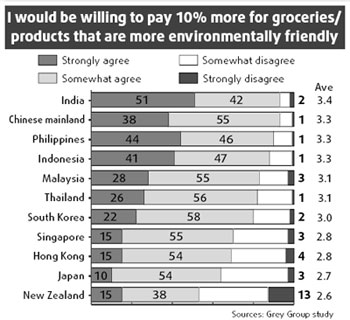Asian consumers get environmentally savvy
From the late 1980s to the mid-90s, issues of environmental concern and governance were frequently talked about in the West. But it's now becoming a hot topic across boardrooms in Asia, as public awareness grows.
China, India and Russia top the list of the world's most polluted places, according to a recent global survey. The three countries are each home to two of the world's top 10 polluted sites. In Asia, the key reason for this is the speedy industrialization that has occurred in the past decade, especially in China.
Eye On Asia, a Grey Group proprietary study across 14 Asian countries, probes environmentalism from a behavioral perspective - would you as a consumer give up convenience or pay more if it was better for the environment? We all believe that protecting the environment is important but does that awareness really prompt us to take action?

The report found that those who strongly agree there's a need to take action in the region are from India. China ranks fourth, with 38 percent willing to pay more for groceries and third, with 40 percent willing to give up some convenience to preserve the environment.
The lowest level of personal action across Asia is in Japan at 10 percent and in Singapore. Both feel that the government should lead any initiative on the environment and that following government policy is sufficient. Overall the study found that a willingness to take action correlates with a future desire to "enjoy the great outdoors".
The young tend to have a higher concern for the environment, but willingness to take action is the strongest among those over 40.
Significantly, from a communications and marketing perspective, the strongest discriminator is reflected in the segmentation of how people respond to brands. The report found that 52 percent of "new brand enjoyers" strongly agree to act differently to help preserve the environment, while of the "individual believers" only 13 percent will. And 87 percent of the former will also give up everyday convenience as a key component of their future desire to "enjoy the great outdoors".
While concern is slow to translate into action at the individual level across Asia, it is definitely a key expectation from corporations and the government. This is especially true for bigger brands where environmentalism and sustainability are fast becoming criteria for brand choice.
The report found that the factors that impact brand choice among Asians are: trust (and quality); understanding of consumer needs; innovation; and companies with values and ethics.
It's interesting that companies with values and ethics ranks higher than status choices or other criteria that would lean toward conspicuous consumption. Clearly perceived value today is not just a function of price or service, but is also driven by issues like the environment, health and labor conditions.
In China, growing concern for the environment among the public has prompted one of the country's largest State-run companies to take action.
With support from manufacturers like Motorola, Nokia, and Sony Ericsson Mobile Communications, China Mobile is leading a public service campaign called "Green Box" that encourages its customers to deposit used handsets, phone batteries and other parts in designated green boxes placed in 150 sales offices in 31 provinces. The company is recycling the old equipment or disposing it using environmentally responsible methods.
Since it is the world's largest mobile phone service provider with over 287 million subscribers, China Mobile's efforts could produce dramatic results. Through the ad campaign created by Grey Group Beijing, over 30,000 used handsets have been collected over the past seven months.
Beyond consumers and corporations, the third factor driving the green trend across China is government and regulatory bodies.
"Green Olympics", the theme for the 2008 Beijing Olympics, is a testimony to their commitment. The Green Olympics theme emphasizes the principle of sustainable development, the harmony and mutual promotion of humans and nature. The Beijing municipal government has established a Green Olympics regulation plan, with a total investment of $12.2 billion, in a bid to construct 20 key environmental protection projects in and around the capital.
The green trend is catching on in China and across Asia. We are witnessing the rise of a more sophisticated and discerning Asian consumer who's willing to take personal action and prefers brands that are ethical and project a sense of moral and social sensitivity. But we are still a long way from building this sensitivity right down to the grassroots.
Moving ahead the real challenge will be reaching the point where this transforms into a mass revolution. Go green, save the Earth.
The author is Regional Communications Planning Director of Grey Group, a WPP company and one of the world's largest marketing communications networks
(China Daily 10/18/2007 page15)














